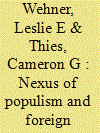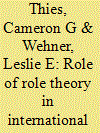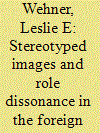|
|
|
Sort Order |
|
|
|
Items / Page
|
|
|
|
|
|
|
| Srl | Item |
| 1 |
ID:
177610


|
|
|
|
|
| Summary/Abstract |
This article analyses Chile’s foreign policy, utilizing a multilayered identity model, one that covers the country’s most stable identity layer as a sovereign state, an intermediate layer in which processes of identification between Chile and its peers unfold, as well as the most superficial layer in which key entrepreneurs advance new identities. Chile’s identity is examined through the lens of role theory, in order to unpack this country’s sense of being a misplaced state in South America. Chile’s role behaviour as a soft case of misplacement is triggered at the most superficial layer and partly permeates the intermediate layer of identity, despite the country’s historical experiences which have given rise to a sense of uniqueness in South America. Thus, this article shows how Chile’s role-play has tended to increase and/or offset its sense of misplacedness in South America in the period starting from 1990 and continuing into the new century.
|
|
|
|
|
|
|
|
|
|
|
|
|
|
|
|
| 2 |
ID:
178497


|
|
|
|
|
| Summary/Abstract |
The term populism has recently gained visibility in the media and policy world to describe the foreign policy principles, rhetoric and strategies of political actors in the United States and some European states. Yet, populism is nothing new in Latin America where it has enjoyed a long tradition among leaders of various countries. Populism has thus far largely been treated as a national phenomenon with few international manifestations. Thus, this article adopts the concept of populism and its core components such as anti-elitism, the people, and the general will within a role theory framework to trace the foreign policy roles that populist governments play as a first step to improving our knowledge on the nexus of populism and foreign policy. We examine this framework in the context of the foreign policy of Carlos Menem of Argentina and Hugo Chávez of Venezuela.
|
|
|
|
|
|
|
|
|
|
|
|
|
|
|
|
| 3 |
ID:
141656


|
|
|
|
|
| Summary/Abstract |
This article sets out how secondary powers in South America—that is, Argentina, Chile, and Venezuela—see Brazil as a regional power, as well as Brazil's strategy of using its regional powerhood to further its own ambitions of becoming a global power on the international stage. The article assesses the expectations of these three countries, specifically in terms of what kind of roles they attribute to Brazil. Following this empirical interest, the article develops a role theoretical framework for understanding the importance of Others' expectations for the role con-ception and enactment of the Self. The article also elaborates on the interplay of master roles and auxiliary roles in which Others become key shapers of those roles, as well as on how the role interaction between a regional power and the secondary powers is bound to their differing notions of “region,” as strategically used by each as part of their foreign policy.
|
|
|
|
|
|
|
|
|
|
|
|
|
|
|
|
| 4 |
ID:
170607


|
|
|
|
|
| Summary/Abstract |
This article demonstrates the benefits of using a role theory approach in the field of international political economy (IPE) by demonstrating its benefits relative to variants of the social constructivist paradigm, especially vis-à-vis identity-based accounts of IPE. This article also documents how role theory always had a home in IPE even before the constructivist revolution in the 1990s. The social interactionist dimension in the work of Herbert Mead and his notion of a general other are linked to the relational ideas of friendship and impartial spectator present in the works of the founding father of classical political economy, Adam Smith. These similar ideas about the self and their surrounding social environment are a useful starting point to locate role theory in IPE and demonstrate its analytical advantages within social constructivism. After showing the ‘forgotten’ place role theory has always had in IPE, the article illustrates the potential of using a role theory approach within the field of IPE through an illustrative analysis of the Greek economic crisis.
|
|
|
|
|
|
|
|
|
|
|
|
|
|
|
|
| 5 |
ID:
134494


|
|
|
|
|
| Summary/Abstract |
This article assesses the possibilities for the development of foreign-policy role theory using the concepts of traditions and dilemmas from the interpretive approach to foreign policy, as well as narratives as an interpretive method for analysis. While role theory is rich in conceptualization, it still suffers from overt structuralism, inattention to domestic processes of divergence/convergence affecting national roles, and from methodological underdevelopment. This article goes beyond studies of national role conceptions that present foreign-policy behavior as determined by the national role, thus making it possible to understand the interplay of competing voices in determining a national role, the processes of role change, and the resulting reorientation of foreign policy. This article illustrates the possibilities and limitations of merging role theory and the interpretive approach through the study of Chile's and Mexico's attempts to join the Asia Pacific Economic Cooperation (APEC), their accession to APEC, and their performance once accepted into APEC.
|
|
|
|
|
|
|
|
|
|
|
|
|
|
|
|
| 6 |
ID:
193012


|
|
|
|
|
| Summary/Abstract |
Populist leaders unfold anti-elite rhetoric to sustain the ‘in-group’ morale of the ‘people’ they represent. Populist projects contain an ‘us’ versus ‘them’ dimension constituted by the stereotyped images that serve to inform the role-selection process in foreign policy. When images shaping roles on the international stage are used against the ‘out-group’, they become stereotypes of other actors. Therefore, this article explores how anti-pluralist populist leaders such as Jair Bolsonaro and Donald Trump use stereotyped images, and how these images – which speak to intention, affective tags and the evaluation of options – shape the foreign policy role behaviour of the states in question. The article develops a framework at the interplay of images and roles to analyse how these two aspects are used by the leader in an oversimplified manner to delineate boundaries between self and other, and thus to identify the membership base of the populist project versus those who are seen as a threat to their populist foreign policy.
|
|
|
|
|
|
|
|
|
|
|
|
|
|
|
|
|
|
|
|
|